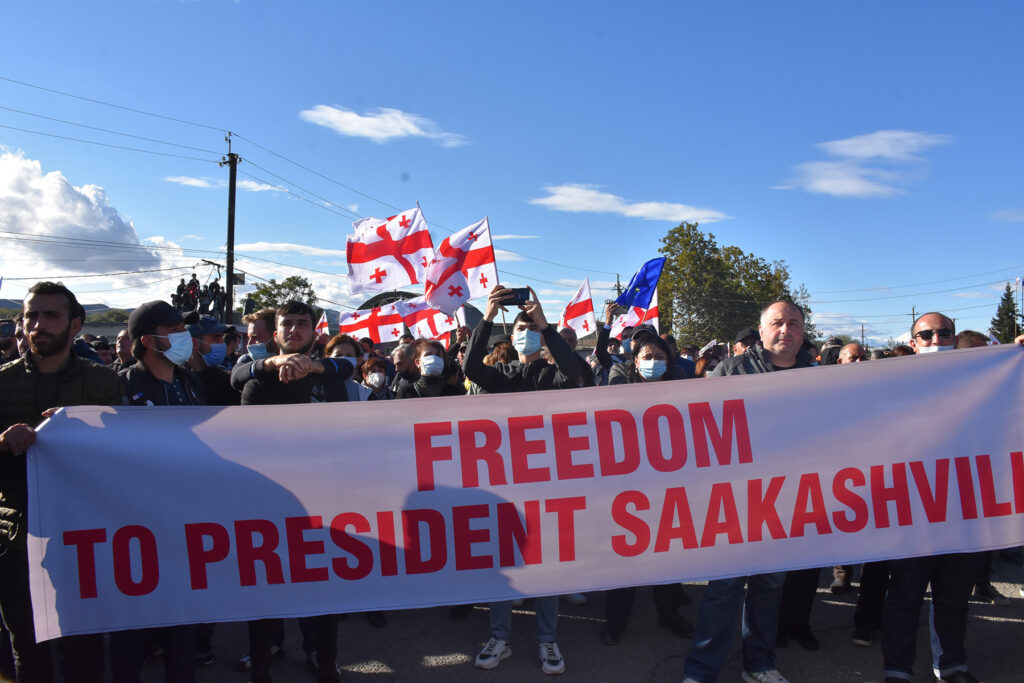Several hundred supporters of Mikheil Saakashvili have gathered outside the 12th Prison in Rustavi, 20 km south of Tbilisi, where the former Georgian President is currently being held to demand his freedom.
Monday marks three days since Georgia’s third President was arrested following his highly anticipated arrival in Georgia, the details of which remain obscure.
Georgian authorities arrested Saakashvili in Tbilisi on 1 October, a day before municipal elections that were marked by high polarisation between the former president’s United National Movement (UNM) and Georgia Dream, the party in power.
In the latest vote, Georgian Dream secured another win while facing runoffs in major cities, including Tbilisi.
[Read more on OC Media: Preliminary results give Georgian Dream victory in local elections]

Saakashvili has been convicted in absentia on several counts of abuse of power in Georgia, including ordering an attack on political opponent Valeri Gelashvili and illegally promising to pardon law enforcement officers implicated in the 2006 murder of Sandro Girgvliani.
Despite the verdicts, Saakashvili had so far successfully avoided the hand of Georgia’s justice as no country he visited or resided in in recent years had agreed to extradite him. Government critics have also questioned if Georgian Dream have been fully consistent in their declared wish to prosecute Saakashvili in Georgia.
Following his arrival in Georgia, Georgian authorities are adding an illegal border crossing to his list of criminal charges.
At the end of his 4 September interview with TV channel Imedi, Georgian Prime Minister Irakli Gharibashvili half-jokingly threatened to press more ‘articles’, criminal charges, against Saakashvili unless he ‘behaved’.
Following his arrest, Saakashvili has remained defiant and in an open letter, called on Nika Melia, his replacement as UNM Chair and a mayoral candidate, to wage a ‘constant and far more forceful attack’ against Georgian Dream in the runoffs.

Georgian-Ukrainian understanding?
Saakashvili’s representatives as well as Public Defender Nino Lomjaria have reported that he has started a hunger strike in protest against his detention and that he has demanded a meeting with Ukraine’s consul in Georgia.
Currently, the third Georgian President holds only Ukrainian nationality and since early 2020, has been heading the Ukrainian National Council of Reforms.
On 3 October, Georgian PM Irakli Gharibashvili claimed that there was ‘no one in power’ in Georgia today who would consent to free Mikheil Saakashvili from prison, regardless of who might appeal for his freedom.
At the same time, the PM hailed a statement by President Salome Zurabishvili in which she ruled out pardoning Saakashvili.
In the same Imedi interview on Sunday, Gharibashvili praised his relationship with Ukraine’s President Volodymyr Zelenskyy and PM Denys Shmyhal, citing the extradition of a high ranking official under Saakashvili’s rule, Megis Kardava, from Ukraine to Georgia on 17 September as a testimony to it.
‘Take the case of Megis Kardava's extradition or that of Saakashvili… I'll skip the details’, Gharibashvili told Imedi.
Contrary to Gharibashvili’s suggestion of an understanding or cooperation between the two countries over Saakashvili’s detention, Ukrainian authorities have signalled, at least publicly, their unhappiness with Saakashvili being arrested in Georgia.

Several hours before Gharibashvili’s interview, President Zelenskyy claimed to be seeking Saakashvili’s return to Ukraine, adding that he was not informed about his departure for Georgia in advance.
On 1 October, the Georgian Foreign Ministry replaced Teimuraz Sharashenidze with Giorgi Zakarashvili as Georgian Ambassador to Ukraine.
Sharashenidze returned to Ukraine in April nearly a year after he was recalled for consultations in May 2020 following Saakashvili's appointment as chair of the National Reforms Council in Ukraine.
International reactions
International reactions to the former president’s arrest have so far been relatively muted.
On election day on 2 October, US Ambassador to Georgia, Kelly Degnan, told journalists that Saakashvili’s case would be watched closely.
‘Mr. Saakashvili’s case will be a test of the Georgian judicial system, and we’ll be watching to see if the case is handled impartially and in accordance with Georgian law and Georgia’s international obligations’, she said.

On Sunday, the Group of European Conservatives and Reformists of the European Parliament (ECR Group) praised Saakashvili's democratic record during his presidency and called the charges against him 'unfounded', demanding they be dropped.
The ECR Group is the sixth largest faction in the EU parliament and includes Poland’s ruling Law and Justice party as well as a number of smaller parties.
‘Politicians should be debating issues freely, not through sending letters from prison’, the ECR Group said in a statement.




 4 October 2021
4 October 2021



